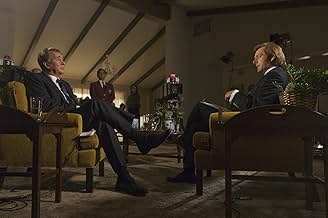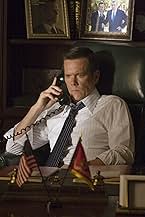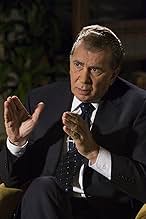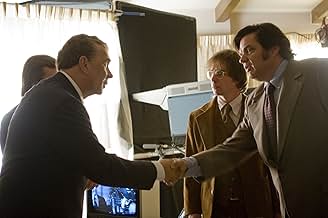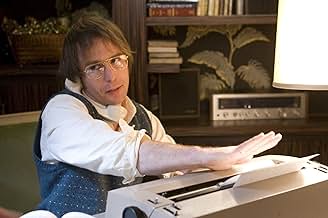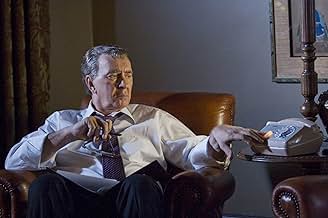अंग्रेज़ी बातचीत के कार्यक्रम के मेज़बान डेविड फ्रॉस्ट और पूर्व राष्ट्रपति रिचर्ड निक्सन के बीच वाटर गेट के बाद के टेलीविज़न साक्षात्कारों का पुनःकथन.अंग्रेज़ी बातचीत के कार्यक्रम के मेज़बान डेविड फ्रॉस्ट और पूर्व राष्ट्रपति रिचर्ड निक्सन के बीच वाटर गेट के बाद के टेलीविज़न साक्षात्कारों का पुनःकथन.अंग्रेज़ी बातचीत के कार्यक्रम के मेज़बान डेविड फ्रॉस्ट और पूर्व राष्ट्रपति रिचर्ड निक्सन के बीच वाटर गेट के बाद के टेलीविज़न साक्षात्कारों का पुनःकथन.
- 5 ऑस्कर के लिए नामांकित
- 23 जीत और कुल 81 नामांकन
फ़ीचर्ड समीक्षाएं
For all many of us who lived through the Nixon presidency and Watergate, this is not the stuff of nostalgia or happy reminiscence. And when the Nixon tapes were published and his bigotry against just about everyone was revealed in explicit "expletive deleted" language, it was time to get disgusted all over again.
Here, portrayed by Frank Langella, we see Nixon as a lonely, vulnerable, angry, and bitter human being, a man who's made a bed he must sleep in for the next twenty years. We also see a manipulative and highly intelligent individual who, despite a great deal of success, had no self-worth. It's the feeling of being an outsider, of never being good enough, that led him to some atrocious decisions.
It's Langella's performance and Michael Sheen's wonderful performance as David Frost -- playboy, comedian, talk show host, and party-giver turned investigative journalist -- that anchor "Frost/Nixon." They are given great support by Kevin Bacon as Nixon's protective assistant, Jack Brennan, Sam Rockwell as James Reston, determined that Nixon pay for Watergate, as well as Oliver Platt, Matthew Mcfadyen, and Toby Jones.
I found the determination of Frost as he attempted to raise financing for the interviews and get networks interested -- with no luck -- very admirable and inspiring. And his gut instinct paid off for him big time.
I transcribed an interview with Nixon that took place in his home in the 1980s, as well as a speech he made during one of the Presidential election periods. He was a brilliant speaker, and as an interviewee, when the interview was over, he engaged the reporter in a very friendly personal conversation.
In the end, both those listening experiences made me sad, as did this film. For everything he achieved, Richard Nixon had undeveloped gifts and potential. He robbed the world of a lot more than the ability to trust government. But in the end, as the film shows, he robbed himself the most.
I have a personal dislike for Ron Howard as a director, a result of my sensibilities mainly, I suspect. Howard strikes me as a particularly heavy-handed, didactic director who has wasted many great concepts on mediocre films (out of 18 films I've seen by him, I only genuinely liked "Apollo 13". I was expecting the worst with "Frost/Nixon", but instead was met with one of the most entertaining films in a while, and a remarkably well-acted, even-handed, quality character study. I suppose I should have been prepared for a quality screenplay given the success of this Peter Morgan play in New York and London, but I was hardly expecting something this good. It's glib, funny, well-paced, expertly-structured, clever, observant, and intelligent. It creates a fascinating Nixon, played brilliantly by the great Frank Langella, though this is not quite up there with the likes of Oliver Stone's sadly under-appreciated "Nixon" or Robert Altman's endlessly fascinating "Secret Honor". The film is almost surprisingly well-directed, although there is a bit of the old TV trick of shaking the camera a bit, panning too often, to give the illusion of motion and energy when there's really just people in a room talking. The conversation's interesting enough, there's no need for that. Oh well, I suppose I am nitpicking.
As far as Nixon movies go this is lightweight entertainment with plenty of comic moments largely leading up to two or three scenes of real human vulnerability. Aside from these scenes (which are truly, truly excellent), Peter Morgan conceives the meeting as something of a chess match with the unpredictability of a boxing match. To use J. Hoberman's words 'a prize fight between two comeback-hungry veterans, only one of whom could win'. On paper this could have been very heavy on amateur psychoanalysis and low on entertainment value but Morgan and I suppose Howard as well are clever enough to have some fun with the idea. This is not a criticism at all, the film has moments of surprisingly real depth and intellectualism, but overall the nature of the script works in its favor, makes those scenes more interesting, more ultimately rewarding.
"Frost/Nixon" is an entertaining, exciting film, around as populist as I expected but in a very different way. This is the sort of writing we don't see enough of, particularly not in today's films. It's vaguely reminiscent of a particularly good BBC television drama. The cast is certainly good enough for that. Langella and Michael Sheen are outstanding, both manage to accurately portray the real-life men they are portraying while still adding some characterization and mannerisms of their own. Langella's Tony-award winning performance might be up for Oscar consideration soon, but Sheen's Frost almost upstages him at times. No heavy-handedness, no political 'messages', just a fun, clever script and a great cast in a well-made film.
The acting duo of Frank Langella & Micheal Sheen (Nixon & Frost) are set on a collision course that finds two deeply passionate personalities at the mercy of their insatiable desires. Both actor's portrayals are a study of affectation and body language, pleasurably accurate and yet not simply an impersonation. Indeed, the film never strays from the distinct Howard format that breathes so much life (read intimacy) into this familiar and yet mysterious relationship that exists for so many people who lived through the exceptional event.
Make no mistake, this is by no means a two man show, quite the contrary. In fact, the wealth of supporting roles is perhaps the finest feature of this production. Bacon's devoted and stalwart marine practically glints of gun metal and polished shoe leather. The trio of Gould, Platt and Rockwell portray effortlessly the roles of the men who, brick by brick, constructed the platform from which Frost so successfully and serendipitously elicited one of the greatest unspoken confessions of all time. Rebecca Hall is delicious and demure, constantly filling scenes with her elegant presence.
Perhaps the richest praise should be reserved for Peter Morgan, who has, without question, penned a truly captivating and insightful story that delivers not only a satisfying comprehension of a complex time in US history, but captures a generation's struggle to come to terms with the frailty of leadership that still echoes today.
Not to be missed, this film can be enjoyed on multiple levels and will undoubtedly be regarded as seminal for it's engrossing insight and expert depiction.
This is a film based on a play that neither felt trapped in staginess nor weakly expanded with just the stage dialogue delivered exactly but in a variety of outdoor locales. I have to give Peter Morgan a lot of credit here. I saw the play in London and wondered throughout production of the film how they would escape its theatricality. Many recent films from plays like Proof, Closer, The Producers, have failed to throw off the shackles of stage feel. Not that all bad films, many served as a good way to see the play if you hadn't had the chance, but they weren't necessarily compelling films in their own right. What is so impressive about Morgan's work here is that in adapting his own play he has not been precious, he has not tried to enforce his already successful stage-play onto a film director he has wholly reworked it from beginning to end and yet retained all the gravity and drama that the play elicited. If you saw the play everything key is here and yet you can feel the difference the pacing is changed, the power achieved in different ways.
For this Howard also deserves credit. To have filmed the play as it was would have been disastrous on film one long two-hander scene after another, duelling narrators. And given the reverence the play has enjoyed a less experienced director could have fallen into this trap or that of simply changing the settings, but Howard knows when we need quick cuts, when a long drawn out piece that worked on stage needs to be reduced to a couple of lines and a post-scene reaction, and when he needs to hold with a scene and let it play between the two leads. This happens in several impressive moments in the latter half of the film.
For some this might constitute the films biggest flaw however. Morgan and Howard can't escape the fact that in the final stages of the film it is the head-to-head scenes of Frost and Nixon that are key and they must stay with them more. This is necessary, but it sadly means that the supporting players, so well established and broadened out to expand the scope in the first half, fall be the wayside. A superb Toby Jones as Irving 'Swifty' Lazar, Matthew Macfadyen as John Birt and always reliable Oliver Platt as Bob Zelnick all but disappear and only Kevin Bacon and Sam Rockwell play any significant role beyond the two leads in the final stages. This is a shame. It may best serve the story creating the sense of claustrophobia necessary to keep you gripped but it does feel like a film of two halves because of it and it noticeable.
Frank Langella and Michael Sheen are superb, as they were on stage, and Langella will take a lot of beating for the Oscar this year. There are many moments here when I was so involved I forgot I wasn't watching the real Nixon. It's not that he looks that like Nixon but he is so real you believe it completely and have to remind yourself you're watching an actor.
Platt is reliably Platt. Bacon is also his typically understated solid presence doing a lot with little. Toby Jones is fantastic in a small role instantly memorable; and Rebecca Hall builds on a series of strong performances. But in the supporting cast it is Rockwell that stands out. Sure, he has the most to do but he is completely in this role, he manages to sink into the role which is something he rarely does. He matches the skill he showed in Lawn Dogs and Confessions Of A Dangerous Mind here and it is great to see him back at his best.
I thoroughly recommend this film.
Morgan's source material translates smoothly onto film. Much as he did with "The Queen", he mixes a behind the scenes look at the immediate time period leading up to the historical event and closes with an almost word-for-word dramatization of said event. Also, like "The Queen", we have the excellent Michael Sheen on board, who after playing Tony Blair now takes on the mannerisms of the legendary British talk-show host and man-about-town David Frost. Director Ron Howard nicely interweaves archival news footage, faux-post interviews with the secondary players, and the dramatic reenactments of the actual Frost/Nixon interviews. Howard's studied but pedestrian style of direction lends itself well to this type of docudrama as he allows the actual events to speak for themselves and the fine performances to shine on their own. Though it takes quite awhile to get where it's going, the final interview where Frost takes Nixon head-on about the Watergate cover-up is a payoff well worth the wait.
Of course the most fascinating aspect of the film is Frank Langella's portrayal of a shamed and swollen Richard Nixon. He plays him as a fallen man desperate for an act of contrition but still in too deep with his old trickery and slick ways. His performance, and the way it connects with the audience, is wonderfully layered. On one level, we have an aged actor thought to be well past his prime firing back on all cylinders in a renaissance role that will likely lead to a showering of award nominations. The way the film reduces his performance to that one lingering close-up after being steamrolled by Frost on the last day of the interview leaves a lasting impression. But it also works on another level as it is meant to represent the reduction of Nixon's political life to that one lingering close-up on the television monitor when he realized it's all over for him. The audience members who remember watching the interviews and can picture the actual close-up they saw on their TV screens are now allowed to share a communion with the audience members who weren't even born yet and now only have a memory of Langella's face on the silver screen. In that sense, Langella truly became Nixon, and his performance will not soon be forgotten.
क्या आपको पता है
- ट्रिवियाFrank Langella and Michael Sheen repeated the roles they created on stage. Ron Howard would only agree to direct if the studio would allow both actors to appear in the film version.
- गूफ़Frost and Nixon behave as if they've never met before. In real life, Frost interviewed Nixon when he ran for president in 1968. Nixon enjoyed the interview so much that after he was elected, he met with Frost in the White House to discuss producing a television special.
- भाव
Richard Nixon: That's our tragedy, you and I Mr. Frost. No matter how high we get, they still look down at us.
David Frost: I really don't know what you're talking about.
Richard Nixon: Yes you do. Now come on. No matter how many awards or column inches are written about you, or how high the elected office is, it's still not enough. We still feel like the little man. The loser. They told us we were a hundred times, the smart asses in college, the high ups. The well-born. The people who's respect we really wanted. Really craved. And isn't that why we work so hard now, why we fight for every inch? Scrambling our way up in undignified fashion. If we're honest for a minute, if we reflect privately, just for a moment, if we allow ourselves a glimpse into that shadowy place we call our soul, isn't that why we're here? Now? The two of us. Looking for a way back into the sun. Into the limelight. Back onto the winner's podium. Because we can feel it slipping away. We were headed, both of us, for the dirt. The place the snobs always told us that we'd end up. Face in the dust, humiliated all the more for having tried. So pitifully hard. Well, to *hell with that*! We're not going to let that happen, either of us. We're going to show those bums, we're going to make 'em choke on our continued success. Our continued headlines! Our continued awards! And power! And glory! We are gonna make those mother fuckers *choke*!
- क्रेज़ी क्रेडिटMichael Sheen and Frank Langella are credited simultaneously before the title. Sheen's name is on a lower level, but further to the left; while Langella's is higher up, but pushed to the right. Therefore, depending on whether you read the card top-to-bottom or left-to-right, either actor can be seen as being credited first.
- कनेक्शनFeatured in At the Movies: Summer Special 2008/09 (2008)
- साउंडट्रैकBy George It's David Frost
Written by George Martin (as George Henry Martin)
Performed by Atli Örvarsson
टॉप पसंद
विवरण
- रिलीज़ की तारीख़
- कंट्री ऑफ़ ओरिजिन
- आधिकारिक साइट
- भाषा
- इस रूप में भी जाना जाता है
- Frost/Nixon - La entrevista del escándalo
- फ़िल्माने की जगहें
- Palos Verdes Estates, कैलिफोर्निया, संयुक्त राज्य अमेरिका(Nixon "San Clemente" Compound)
- उत्पादन कंपनियां
- IMDbPro पर और कंपनी क्रेडिट देखें
बॉक्स ऑफ़िस
- बजट
- $2,50,00,000(अनुमानित)
- US और कनाडा में सकल
- $1,86,22,031
- US और कनाडा में पहले सप्ताह में कुल कमाई
- $1,80,708
- 7 दिस॰ 2008
- दुनिया भर में सकल
- $2,74,26,335
- चलने की अवधि2 घंटे 2 मिनट
- रंग
- ध्वनि मिश्रण
- पक्ष अनुपात
- 2.35 : 1
इस पेज में योगदान दें








